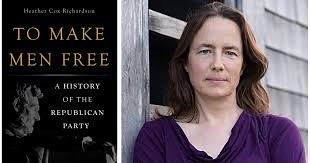Ray Epps, Target of Jan. 6 Conspiracy Theory, Is Sentenced to Probation
Ray Epps #RayEpps

Ray Epps, the former Trump supporter who became a target of a conspiracy theory that he was an undercover government agent who helped to instigate the Jan. 6, 2021, attack on the Capitol, was sentenced on Tuesday to a year of probation for his own small role in the riot instead of the six months in prison that prosecutors had requested.
The probation sentence, imposed after Mr. Epps had pleaded guilty last year to a single count of disorderly conduct stemming from his presence in the pro-Trump mob near the Capitol, brought his prosecution to a close. But it was unlikely to end the persistent false narrative that he was a provocateur out to entrap his fellow conservatives on Jan. 6 even though he, his lawyer, the prosecutor and even the judge overseeing the case all asserted in open court that the tale was preposterous.
“Trust in elected officials and Fox News led to my gullibility in believing the election was stolen,” Mr. Epps told Judge James E. Boasberg in Federal District Court in Washington. “What I witnessed was rage and vulgarity on a level I’ve never seen before, and it was generated by people like me, not the F.B.I. or antifa.”
Speaking in the same courthouse where former President Donald J. Trump was attending a federal appeals court hearing related to his prosecution on charges of trying to overturn the 2020 election, Judge Boasberg told Mr. Epps, “While many defendants have been vilified in a way unique to Jan. 6, you seem to be the first to have suffered for what you didn’t do.”
The F.B.I. began looking into Mr. Epps, a former rancher and Marine from Arizona, almost immediately after Jan. 6 as investigators came into possession of video of him on the streets of Washington on Jan. 5 telling a group of Trump supporters to “go into the Capitol” the next day.
Even though Mr. Epps cautioned that the group should do so peacefully, several people in the crowd appeared to suspect him of being a government plant and hounded him with jeers of “fed!”
Other videos from Jan. 6 itself showed Mr. Epps leaning toward a fellow rioter at a barricade outside the Capitol, seeming to whisper something in his ear. That man — a Pennsylvania barber named Ryan Samsel — confronted officers within minutes, leading to the first breach of police lines at the building.
Within two days of the Capitol being stormed, Mr. Epps saw his photo in an F.B.I. alert and immediately contacted the bureau, telling agents a story that never changed over subsequent interviews with both criminal and congressional investigators. Mr. Epps said that he had indeed encouraged the crowd to go to the Capitol to protest Mr. Trump’s loss in the election but that once he saw the mounting anger in the mob, he quickly sought to de-escalate the crowd, beginning with the man he spoke to at the barricades.
The F.B.I. apparently believed Mr. Epps and in May 2021 declined to prosecute him, ultimately noting that the investigation “did not reveal sufficient evidence” that he had entered the Capitol, engaged in violence or “committed any other criminal violations,” according to newly released records that his lawyer included this month in sentencing papers.
That decision was in keeping with those made about hundreds of others who did not attack the police or go into the Capitol on Jan. 6. But right-wing media figures — including the former Fox News host Tucker Carlson — began to suggest that Mr. Epps had been spared prosecution for a very different reason: because he was a covert government asset under the protection of his handlers.
Despite the fact that there was no evidence that Mr. Epps had any connection to the government outside the four years he spent in the Marine Corps, the story caught fire on the right and was ultimately echoed in congressional hearings by top Republicans like Senator Ted Cruz of Texas and by Mr. Trump himself.
Speaking to Judge Boasberg at the sentencing, Mr. Epps’s lawyer explained what happened next to Mr. Epps and his wife: They faced death threats and had weapons brandished outside their home, weathered targeted scams directed at their business in Arizona and ultimately had to go into hiding in a trailer in the woods.
Judge Boasberg acknowledged those hardships in explaining his sentence, saying Mr. Epps “had to live like a fugitive because of lies others spread.”
It remains unclear why federal prosecutors reversed course and filed a case against Mr. Epps after the initial decision not to charge him. Edward J. Ungvarsky, Mr. Epps’s lawyer, said it appeared odd that the government had changed course after its initial review of video evidence from the riot left them disinclined to bring charges.